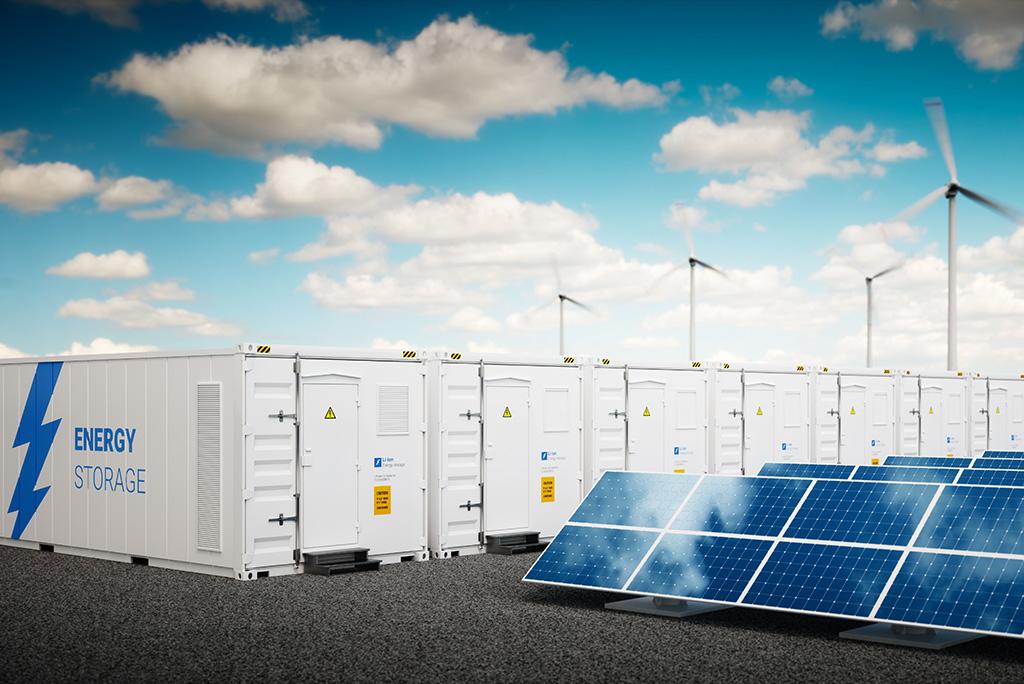
Assessing the Potential of Hybrid Plant Designs
Project Highlights
- Evaluate several energy storage technologies with > 8-hour durations charged with a dedicated wind plant
- Understand the cost, performance, and benefits of energy storage paired with wind as a function of storage discharge duration and system design
- Evaluate the impact of different wind resources on the optimal configuration
- Investigate ancillary benefits of wind + storage co-located plant design to increase grid benefits
Background, Objectives, and New Learnings
Utilities, energy companies, and other electricity providers are exploring a diverse set of pathways to achieve their decarbonization goals in the coming years. On the path to net-zero, regionality plays a key role in resource selection. Some electricity providers are located in regions with strong solar resources, while others are in areas with strong wind potential.
EPRI recently conducted a study to analyze the levelized cost of electricity (LCOE), capital costs, and performance of several energy storage technologies paired with a solar photovoltaic (PV) plant. The purpose of this project is to apply a similar methodology to perform an analysis on the optimization and tradeoffs of different wind + storage hybrid plant configurations. The study will evaluate a large parameter space of energy storage technologies and discharge durations, wind-to-storage ratios, and storage charging capacities. This work will identify wind + storage configurations with the lowest LCOE, the highest annual and seasonal capacity factors, and the highest overall grid benefits generated by the hybrid plant.
This effort will include:
- Investigating the variety of wind resource profiles to incorporate their effect on wind generation quantity and timing.
- Analyzing the effect of storage duration and charge to discharge ratio on the availability and cost-effectiveness of the overall plant under various wind generation profiles.
- Incorporating grid electricity demand and evaluating the cost-effectiveness of the overall wind + storage plant under different grid scenarios.
- Evaluating the grid benefits in the ancillary services market that the plant may be able to provide to improve cost-effectiveness.
- Surveying non-market benefits to co-location, including streamlined permitting, simplified interconnection agreements, and grid congestion reduction.
Benefits
This project aims to further the understanding of the cost and performance tradeoffs of wind + energy storage plants as a function of storage discharge duration and system design. A techno-economic assessment of various energy storage technologies paired with wind is intended to inform the optimization of solar + storage plant designs, support resource planning, and support the development of a safe, affordable, and reliable future power system.
Funders will benefit from insights into the pros and cons of different plant configurations, the effects of different wind generation scenarios, and cost and performance estimates for a range of wind + storage technologies and designs. Many energy companies have a wind-dominated resource mix or substantial contributions from wind generation in their portfolio. This evaluation can help inform future resource planning for such companies and contribute to improved integration of wind + storage plants into their generation portfolio.
Project Approach and Summary
The main energy storage categories to be investigated for this project will include compressed air energy storage, pumped heat energy storage, and lithium-ion batteries. Data on technology performance characteristics and component costs of each storage option, as well as wind turbine cost and performance data, will be collected as inputs to the analysis.
Researchers will analyze multiple categories of onshore and offshore wind resources to evaluate the impacts of different wind and locational parameters (e.g., wind speed, wind availability, and ambient temperature) on plant performance and optimization.
Parametric analyses will help identify optimal configurations for each of the energy storage technologies at various storage discharge durations of at least four hours paired with a wind plant. This will involve developing wind electricity output profiles using a System Advisor Model or a similar wind modeling software and analyzing the full parameter space of storage technologies and wind system sizing using an industrial systems simulator. Analysis will include determining capacity factors for the hybrid plants under three different demand paradigms: baseload, peaking, and solar complement. LCOE estimates will also be compiled for each configuration and paradigm.
Results from the parametric analyses will be evaluated to identify “optimal” configurations, including those with the lowest LCOEs and the highest capacity factors, as well as the tradeoffs between the two.
Deliverables
Results will be communicated with funders throughout the analysis. Specific deliverables are expected to include:
- Periodic webcasts to agree on assumptions and discuss progress
- Webcast presenting draft results
- Webcast presenting final results
- Annotated slide deck technical update report
Price of Project
The price to participate is $44,000 with a minimum of seven (7) funders needed to complete the full scope of work. This project is eligible for Self-Directed Funds or Co-Funding.
Project Status and Schedule
This project is estimated to span 16 months, with an estimated start date of January 2025, running through April 2026.
Who Should Join
This project will provide valuable information to assist with assessing a range of wind + energy storage options for a generation resource portfolio. Companies interested in incorporating wind + storage projects into their resource plans or are interested in developing wind projects with extended plant output profiles will benefit from participation in this project.
Contact Information
For more information, contact the EPRI Customer Assistance Center at 800.313.3774 (askepri@epri.com).
Technical Contacts
Kelyn Wood, 650.855.1081, kwood@epri.com
Member Support Contacts
Jimmy Herren, 650.855.2320, jherren@epri.com
Russell Pennington, 704.595.2413, rpennington@epri.com